We have trillions of bacteria living inside us. While some are good, others can cause harm. And when they live in harmonious balance, you are less likely to experience digestive issues such as bloating, constipation, diarrhea, or stomach pains.
While probiotics help you colonize more beneficial bacteria to balance out the harmful species, there’s a lot that goes into choosing the right one. If you’ve read our Deep dive into your gut microbiome, you’re already familiar with the two main beneficial bacteria – Lactobacillus and Bifidobacteria. Read on to learn about choosing the right probiotic for your individual needs!
Getting in your daily dose of probiotic-rich foods
Your gut microbiome flourishes when you include fibre-rich foods. This is because good bacteria feed on the fibre, and this creates an environment in which they can thrive on. A variety of fermented foods also helps support your gut microbiome. Humans have been fermenting foods since the beginning of time – it used to be our main method of preserving food. Now that we have access to electricity and refrigerators, fermented foods aren’t as prevalent in the average diet.
Fermentation of food occurs when the natural bacteria in these foods feed on sugar (naturally occurring or added) to create lactic acid. During the fermentation process, the bacteria will multiply and promote the beneficial enzymes and B vitamins that will go on to make your gut happy!
To keep your gut microbiome thriving, reach for fermented foods such as:
- Pickles
- Sauerkraut
- Kimchi
- Kombucha
- Miso
- Yogurt
- Kefir
- Sourdough bread
There is no specific recommendation on the amount of probiotic-rich foods you need to eat each day. But what we know is that the greater the variety in fermented foods, the more your gut microbiome can colonize different beneficial bacteria.
What about probiotic supplements?
Probiotic-rich foods should be your first source of probiotics, but some situations may leave you needing more than what your diet can provide.
You may need to supplement with probiotics if:
- You have taken a round of antibiotics in the last 3 months
- You are looking to improve your digestive symptoms (like constipation, diarrhea, IBS)
- You want to boost your immune system
- You don’t regularly eat fermented foods
Choosing the best probiotic for you
A probiotic supplement is only as good as the strains that are encapsulated inside. Each strain of bacteria is carefully selected for its specific beneficial purpose, fermented, concentrated, and to be produced as a capsule, liquid or chewable supplement. When you look at the back of the probiotic bottle, you’ll see strains listed with a unique identification stamp such as Bifidobacterium bifidum HA-132. Many probiotics are made up of a combination of strains, depending on the purpose of the supplement.
Single strain vs. multi-strain probiotics
Most of the time, having more than one strain of probiotic is ideal. Consuming a variety of strains at once is closer to what we would achieve when we eat naturally fermented foods – they can contain billions of strains at once!
Some specific strains have been researched for improving certain conditions. For example, Saccharomyces boulardii is a strain well-known for treating antibiotic-related diarrhea and can be supplemented as a single strain.
Probiotic options for you
Pro-Biotik 15B
Strains (5):
- Bifidobacterium bifidum HA-132
- Bifidobacterium longum HA-135
- Lactobacillus acidophilus HA-122
- Lactobacillus plantarum HA-119
- Lactobacillus rhamnosus HA-111
This everyday probiotic contains the most common strains that are naturally found in the human intestinal tract. Think of this one as a “multivitamin” to enhance your natural gut flora and flourish what you already have! If you don’t generally eat fermented foods, this formula can help support your gut microbiome with the good bacteria it needs.
Pro-Biotik 50B Extra Strength
Strains (14):
- Bifidobacterium animalis subsp. lactis BI-07
- Bifidobacterium animalis subsp. lactis DSM 15954 Bb-12
- Bifidobacterium animalis subsp. Lactis
- Bifidobacterium bifidum Bb-06
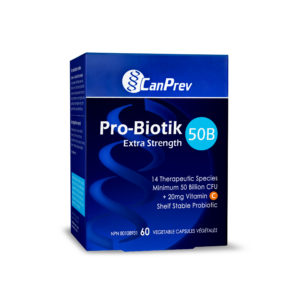
- Bifidobacterium longum subsp. longum BL-05
- Lactobacillus acidophilus La-14
- Lacticaseibacillus casei Lc-11
- Lacticaseibacillus paracasei Lpc-37
- Lactiplantibacillus plantarum Lp-115
- Lacticaseibacillus rhamnosus GG
- Ligilactobacillus salivarius Ls-33
- Lactococcus lactis LL-23
- Lactococcus lactis MJC18
- Pediococcus acidilactici UL5
In cases where you may need more than just a gentle boost of probiotics, you may want to consider our extra strength formula. It is a high-dose, comprehensive formula containing multiple strains to address gastrointestinal upset symptoms like stomach pain, constipation and bloating. It is an excellent option to improve digestive health and boost the immune system during cold and flu season. It’s also great for replenishing bacteria after the use of antibiotics, which are meant to wipe out bad bacteria. But sometimes they wipe out the good ones, too. So taking an extra-strength probiotic such as this one can help restore the good bacteria within you.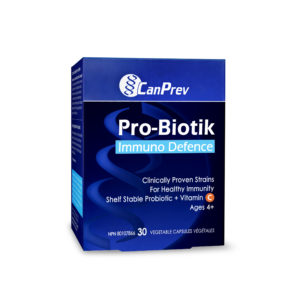
Pro-Biotik Immuno Defence
Strains (3):
- Bifidobacterium animalis subsp. lactis BI-07
- Bifidobacterium animalis subsp. lactis BL-04
- Lactobacillus acidophilus NCFM
The combination of the two Bifidobacterium animalis subsp. lactis and Lactobaccillus acidophilus NFCM help to boost the immune system by increasing white blood cell activity. By supporting the body’s own immunological mechanisms, these bacteria help protect against harmful pathogens in the gut that may lead to infections, fevers and upper respiratory tract illness.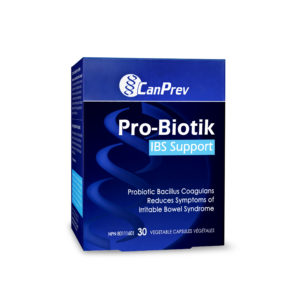
Pro-Biotik IBS Support
Strain (1):
- Bacillus coagulans IS-2
Bacillus coagulans IS-2 is a soil-based probiotic strain that can be used to manage and reduce symptoms of Irritable bowel syndrome (IBS) such as stomach pain, bloating, constipation and diarrhea. Compared to other strains, soil-based probiotics are more heat and acid-resistant, making them better options for gastric conditions.
Pro-Biotik Bowel Transit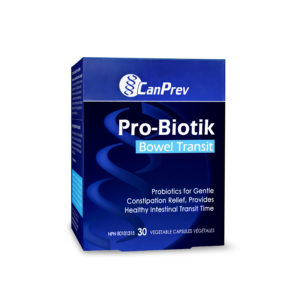
Strain (1):
- Bifidobacterium animalis subsp. lactis HN-019
If you’re tired of relying on laxatives, you may want to improve your bowel movements at the root cause. Bifidobacterium animal subsp. lactis HN-019 works directly on the large intestines to reduce straining, bloating and pain while improving bowel function, bowel movement and stool consistency. When the terrain in your digestive system thrives, you can look forward to easier bowel transit.
Pro-Biotik Chewable
- Lactobacillus acidophilus NCFM
- Bifidobacterium lactis BI-07
For those that aren’t a fan of capsules, we have a chewable version of our immunity probiotic formula. Lactobacillus acidophillus NCFM and bifidobacterium lactis BI-07 increase immune activity and regulate inflammation in the digestive system. It’s a great everyday addition to enhance your natural gut flora. And it’s safe for kids too!
Pro-Biotik Infant Drops
Strains (2):
While the exact cause of colic, defined as long periods of crying without an obvious cause, is generally unknown, research suggests that it’s often based in digestive upset. The gut microbiomes of infants are still developing, and even small imbalances can have a significant impact. Luckily, adding the right strains can provide relief from their pain. Lactobacillus rhamnosus GG improves colic-related inflammation so that your little one can rest easy. We also added vitamin D to support the development of healthy bones and teeth.
Pro-Biotik Powder Toddler to Teen
Strains (8):
- Bifidobacterium breve HA-129
- Bifidobacterium infantis HA-116
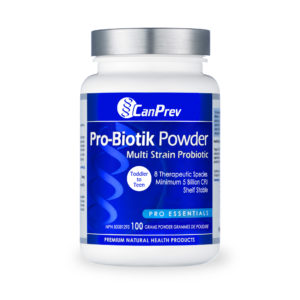
- Bifidobacterium bifidum HA-132
- Bifidobacterium longum HA-135
- Lactobacillus acidophilus HA-122
- Lactobacillus helveticus HA-501
- Lactobacillus plantarum HA-119
- Lactobacillus rhamnosus HA-500
Growing kids need probiotics too! This combination of Bifidobacterium and Lactobacillus was chosen to prevent a variety of conditions that arise from time to time. It was created to act as a maintenance formula to reduce digestive upset symptoms (stomach pain, constipation, diarrhea) or boost the immune system during cold and flu season. This easy-to-use, tasteless powder that can be added to water or any other drink.
V Biotik Vaginal & UTI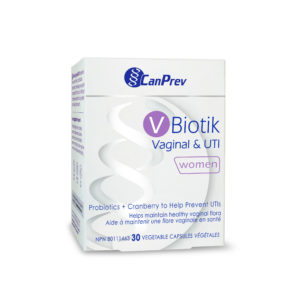
Strains (2):
- Lactobacillus acidophilus La-14
- Lacticaseibacillus rhamnosus HN001
Just like our gut microbiome, our vaginal microbiome is also home to billions of bacteria. And a lot of things can impact the health our vaginal flora, from hormonal changes to stress. That’s why we made a formula that specifically targets vaginal health. V-Biotik Vaginal & UTI is formulated with two Lactobacillus strains to help repopulate and maintain your friendly, infection-fighting bacteria. This formula also has an added 200mg of cranberry extract per capsule to help prevent urinary tract infections (UTIs).
CanPrev’s Pro-Biotiks
From infants to adults, we’ve got probiotics for every stage of life. Our probiotic formulas contain clinically backed strains designed for specific purposes. They’re also shelf-stable and can be taken on the go – unlike most options on the market, CanPrev’s Pro-Biotiks do not need to be refrigerated. Choose from capsule form, powder or chewable, we have them all to fit your lifestyle!
Sources:
How to get more probiotics
A Gastroenterologist’s Guide to Probiotics
Consumption of Bifidobacterium lactis Bi-07
Anti-inflammatory and Anti-osteoporotic Potential of Lactobacillus plantarum A41
Randomized clinical trial: the effect of probiotic Bacillus coagulans
Bifidobacterium lactis Bi-07
Effects of 28-day Bifidobacterium animalis subsp. lactis HN019 supplementation
Lactobacillus rhamnosus GG (ATCC 53103) for the Management of Infantile Colic
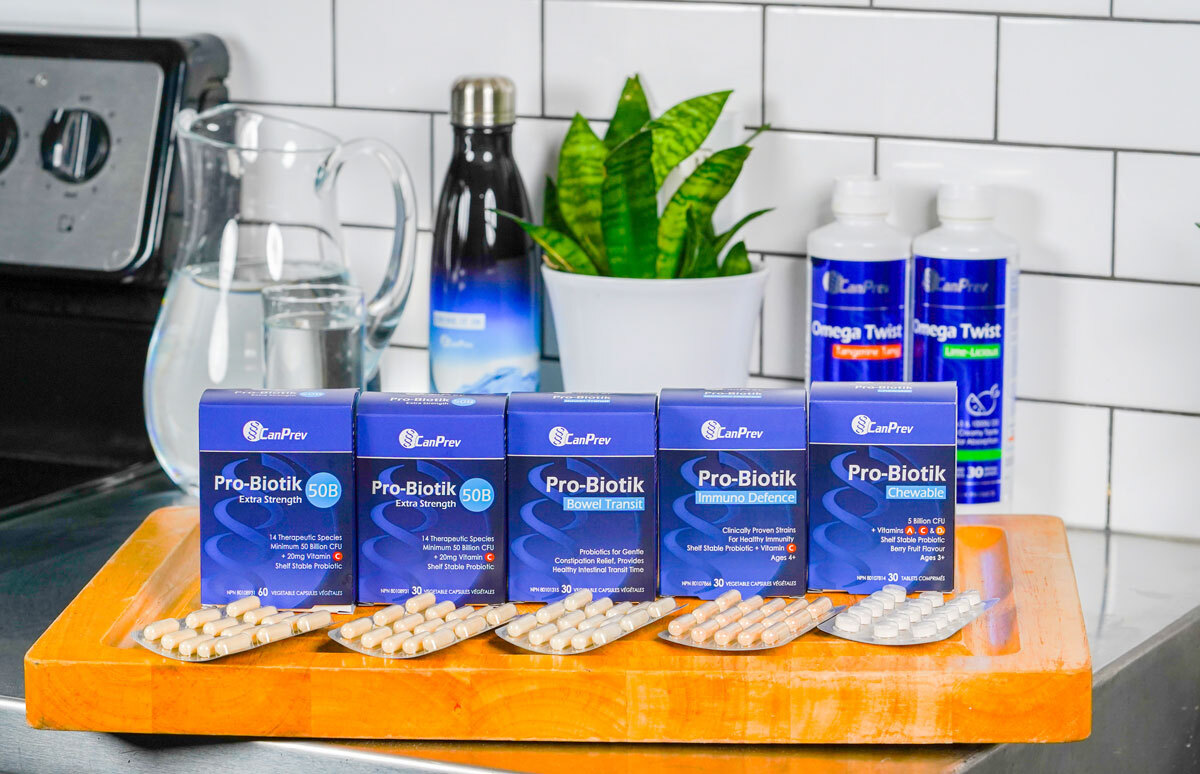
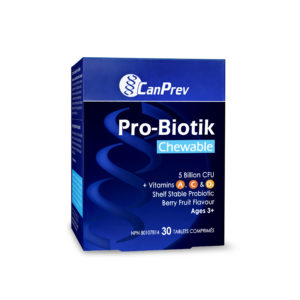
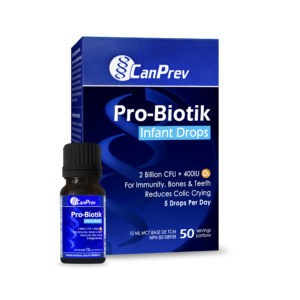






I would like to try Pro-Biotik 50B. I have lymphatic colitis and I believe this could help control the side effects.
Hi there, thank you for your question! Various studies have shown that probiotics, particularly lactobacillus spp (L.acidophilus, L.plantarum) and bifdobacterium animalis strains have been found to benefit various types of colitis through modulating inflammation in the large intestine. Our Pro-biotik 50B and Pro-biotik Immuno Defence both contain the strains listed above and may be helpful in colitis. We recommend that you speak with your Naturopathic Doctor or healthcare practitioner who can better assess you and make appropriate recommendations. Food sensitivities/triggers are also associated with colitis, identifying what food sensitivities/intolerance you may have can also be helpful. Hope this helps!
I am 73 I have been taking Drs presc.Tecta (pantoprazole magnesium) I do not like taking these but I was wondering if there was a Probiotic I could take ??i do walk a lot and excerise would like to hear from you about this ?????
Hi there, thank you for your question.
Probiotics may be beneficial for those who are dealing with GERD or acid reflux as these beneficial bacteria help to support the microbiome not only in the gut, but also in the esophagus. Individuals using pantoprazole may consider supplementing with probiotics to help address any underlying dysbiosis that may be present in the gastrointestinal system. Pantoprazole is a proton-pump inhibitor (PPI) and this type of medication has been associated with decreased bacterial richness and changes in the gut microbiome. Oral bacteria and potential pathogenic bacteria are increased in the gut microbiota of PPI users.
Changes in the esophageal microbiota are associated with esophageal conditions such as GERD. Certain probiotics like Bifidobacterium bifidum have been shown to promote the production of mucin. This is a type of protein that improves the stomach barrier to acidic gastric content.
We would consider reviewing CanPrev’s Probiotik 15B, which contains a blend of Bifidobacterium and Lactobacillus strains which have been associated with an immune response and improving gastric emptying.
Please check in with your health care practitioner and if recommended to you, consider taking the probiotic a few hours after taking the pantoprazole. Please review and follow the product label.
Lifestyle factors may also impact GERD and gastrointestinal health. Avoid foods high in dietary fat, spicy foods, peppermint, citrus, chocolate, tomato sauces, and acidic beverages like coffee. Avoiding eating within 3 hours of bedtime is also ideal and continued exercise is wonderful! Hope this helps.